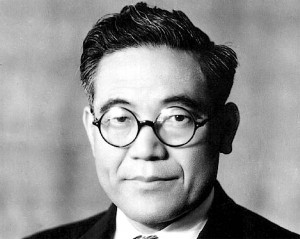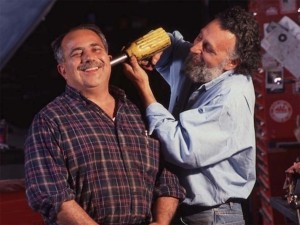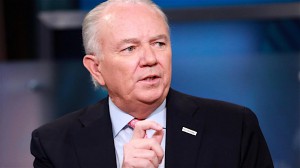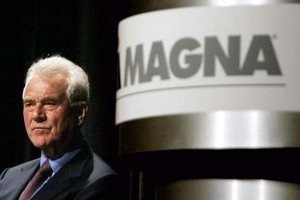A pair of MIT graduates who preferred getting their hands dirty working on cars became perhaps the most unlikely new members of the Automotive Hall of Fame when Tom and Ray Magliozzi — otherwise known as the “Click” and “Clack,” the hosts of the NPR show Car Talk — were honored at a black tie gala on Thursday night.
The event also saw the induction of Kiichiro Toyoda, the founder of the Toyota Motor Corp., Frank Stronach, the Austrian émigré who founded the Canadian-based mega-supplier Magna, and Mike Jackson, the Philadelphia “street kid” who has transformed AutoNation into the country’s largest automotive retailer.
The induction ceremony, which drew the largest crowd ever for an AHF ceremony, had quite a few odd moments. Ray Magliozzi, the younger of the two Car Talk brothers, wondered, “What are we doing here?” And Stronach, challenged the hall full of automotive executives to share more of their profits with workers as part of what he called the “Fair Enterprise System.” Not to be outdone, Akio Toyoda, Kiichiro’s grandson and current Toyota CEO, starred in a video in which he time-travelled back to talk to his grandfather.
This year’s induction ceremony brought the latest class of entrants into the Automotive Hall of Fame, an organization that will, in 2019, celebrate its 80th anniversary. To prepare for the occasion, the event opened up with a look back at many of the other automotive legends already inducted, a group that includes such well-known names as Henry Ford, Bob Lutz and Ransom E. Olds, as well as lesser-known luminaries like Ralph Teetor the blind investor who first developed the device we today know as cruise control.
But the night belonged to the new honorees, and the ceremony opened up on a light note with a video backgrounder on two brothers who grew up in East Cambridge and against all odds wound up on the other side of the tracks, both Tom and Ray Magliozzi earnings degrees from MIT. Neither had any real interest in pursuing professional careers. Instead, they tried their hands at a series of bad job choices, including a do-it-yourself car repair shop.
But their lives changed forever when they were asked to do a show on car repair for local Boston radio station WBUR which, a few years later, was picked up by NPR. They called themselves “Click and Clack, the Tappet Brothers,” an obscure reference to most listeners who just wanted to know what the blinking light on the instrument panel meant, or whether they should change their oil after 100,000 miles.
At their peak, Car Talk was heard on over 500 stations nationwide, with more than 4 million regular listeners. It wrapped up a decades-long run in 2012 with Tom’s retirement – which later was revealed to be the result of the Alzheimer’s disease that took his life a few years later.
Tom’s son Alex was joined by Ray’s son Andrew on stage and while they admitted not having learned much about car repair they clearly inherited their fathers’ legendary sense of humor in what was more a stand-up routine than an acceptance speech. “My father had hay fever,” Andrew said, explaining how their parents’ joint career began, “Al’s father had alimony. So, they started a business.”

Kiichiro Toyoda opted to call his car company "Toyota," because it took eight brush strokes in Japanese, a sign of good luck.
Ray Magliozzi appeared in a brief video in which he wondered “What are we doing here,” before suggesting that, besides making people laugh, the brothers’ “contribution was probably making people comfortable about going to the repair shop.”
Some of those service centers might have been located at AutoNation dealerships. The Fort Lauderdale-based retail chain upended the traditional automotive model in which showrooms were owned by individual entrepreneurs. In 2017, the chain had revenues of $17 billion. But when Mike Jackson came aboard, it wasn’t clear if AutoNation would make it. The brainchild of serial entrepreneur Wayne Huizenga was struggling and he turned to a “street kid from Philadelphia” to get it working.
If anyone personifies the Horatio Alger legend, it’s Jackson. He got his first job at 10, mucking stables. It taught him, he said, a simple lesson: “When I find myself surrounded by horse manure, I start shoveling.”
Jackson fell in love with automobiles when, in his 20s, he saw a gullwinged Mercedes-Benz 300SL race by. He wound up buying a decrepit 190 Benz, instead, and started working for a dealer to pay for repairs. Jackson’s career took a few off turns, like the time he wound up cooking for the Kennedy family at their legendary compound in Hyannisport, Massachusetts. But he later wound up running Mercedes’ North American sales subsidiary and playing a major role in the company’s broad transformation.
In 1999, Jackson was hired on by Huizenga to right the floundering AutoNaton. His boss advised the new CEO he’d be there to support him if things went well. If they didn’t? “Then you’re screwed,” Huizenga replied. Jackson didn’t need to worry. Today, AutoNation is, far and away, the biggest auto retailer in the U.S.
(Auto shows have become “dinosaurs,” says AutoNation’s Jackson. Click Here for more.)
If Jackson represents the American rags-to-riches story, Frank Stronach can tell the Canadian version. He left school at 14 to become an apprentice in his native Austria, moving to Canada at 22. Stronach started a small tool-and-die shop in a garage and slept in a cot in the corner. He got his big break in 1959 when General Motors ordered up windshield sun visor frames and, a decade later, what was called Multimatic Investments was renamed with the acquisition of Magna Electronics.
Today, Magna is a massive conglomerate that last year generated $39 billion in revenues. It has an array of subsidiaries operating 500 factories in 35 countries. But Stronach has crafted a lean organization which also gives those subsidiaries an unusual degree of autonomy. It’s all part of the Magna founder’s unique, homespun business philosophy.
Stronach used his acceptance speech to explain what he calls the “Fair Enterprise System,” a twist on traditional capitalism. The Canadian entrepreneur stressed that capitalism is the key to democracy, but he warned that it also is being subverted as more and more wealth falls into the hands of fewer and fewer people.
“We’ve got to create more capitalists,” Stronach stressed. “If we don’t let more workers participate in wealth’s creation we don’t have a country.”
(Magna building new BMW Z4 and Toyota Supra. Click Here for more.)
The final AHF inductee was himself born into wealth but he used the family’s assets to literally shift gears, creating a company that has transformed the global automotive industry.
Kiichiro Toyoda could have continued working in the textile industry, the family starting out by making looms. But after visiting the U.S. in 1923 he was struck by the growth of the auto industry and how it had transformed the country. He convinced his father to add a car division and, in 1936, rolled out his first automobile, the Model AA. A year later, the enterprise was named Toyota.
It was a slight twist on the family name, but using Japanese kanji, Toyota required eight brush strokes, something considered good luck. At first, that might have seemed unlikely. Early cars had plenty of trouble. And, just as Toyota got going, the country pushed itself into a devastating war. In the years that followed, Japan desperately needed to rebuild and Toyota would soon make the critical decision to enter the American market.
More importantly – certainly to Toyota’s long-term success – Kiichiro Toyoda was a visionary proponent of concepts like kaizen, or continuous improvement, and just-in-time manufacturing. Key to the automaker’s success, they’ve been adopted by most of the rest of the industry.
The carmaker’s founder didn’t live to see that success, however. He passed away suddenly, at the age of 57, in 1952. But that didn’t stop his grandson Akio, the current Toyota CEO, from holding a conversation with Kiichiro creatively using historical footage and the fantasy of time travel.
(Dozens of Toyota employees rally in Washington to oppose import tariffs. Click Here for the latest.)



